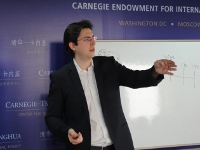Registration
You will receive an email confirming your registration.
IMGXYZ3501IMGZYXFor over a century, the United States has been the dominating energy producer, but this world energy order has recently been overturned. China now has the world’s largest energy market. It has achieved this through a mixed energy portfolio, including private, local state-owned, and national state-owned companies. There is an opportunity for China to become a revisionist nation for energy governance, as the United States and the EU are still largely reliant upon carbon energy sources. The security concerns of China have driven a rapid and fundamental change in world energy markets as China is beginning to import its energy in hopes of maintaining its reserves, similar to the U.S. approach.
Carnegie-Tsinghua hosted Harvard University’s Edward Cunningham to discuss the changing definition of energy security in China andChina’s future as the world’s largest coal importer and energy consumer. Carnegie-Tsinghua’s Paul Haenle moderated the discussion.
Achieving Energy Dominance
- Meeting Demand: China has been able to meet its domestic energy demand through a portfolio of local non-state, local state mines, and central state mines. The latter two provide stability but tend to be largely inefficient, Cunningham said. Through liberalization of coal mining, China was able to use the private mines as a buffer to absorb shocks and meet consumption demands.
- Diversifying Imports: China has both knowingly and unknowingly diversified its energy importers from a variety of regions, Cunningham explained. While the majority of importers use sea lanes as the means of transportation, land transportation is increasing as Central Asia develops more transport infrastructure. China has utilized the infrastructure from a variety of pre-existing global projects to enable it to import energy from the Middle East, Africa, the Asian Pacific, and Central Asia.
From Coal Exports to Imports
- Market Shocks: China has created the largest shift in the global energy market in the past fifteen years, ever since it became the world’s largest coal-importing country. Since coal is the primary source of energy in China and is a “thinly traded” commodity, China’s growing imports sent huge price shocks to world coal consumption. This experience has shown that global oil and coal markets are more flexible than was previously believed, Cunningham said.
- Low Level of Reserves: The United States has twice as many coal reserves than China, which creates direct security concerns in Beijing, Cunningham said. Since the 12th Five Year Plan there has been an active “protective resource policy” with a focus on energy and natural resource imports that is based on the U.S. model.
Future Implications
- Defining Security: The definition of security is changing, and the Chinese government has largely been reacting to the realities of the situation, Cunningham said. China has shown its ability to accommodate the shift in energy patterns and stabilize the market forces that it deals with.
- Reinforcing Trends: One trend that helps to reinforce this energy shift has been an appreciating renminbi (RMB), Cunningham added. While China needs a weak RMB to lead exports, a stronger RMB makes energy cheaper. This will have a growing importance as energy needs increase. The shifting coal reserve composition and significant port expansion are increasing costs of the input sector of inputs, but stagnating U.S. and EU coal markets help keep the prices at a low rate.
Ultimately, Cunningham expressed a positive outlook on the energy market. He argued that energy is the first tangible and measurable stake in the ground for China, encouraging Beijing to play by the same rules as the rest of the international community to secure its energy resources. The internationalization of the world energy market is serving as a learning curve for China both politically and economically, Cunningham asserted. Enterprises are learning through experience in dealing with the international marketplace and this forces China to rethink its approach to securing resources for growth.
